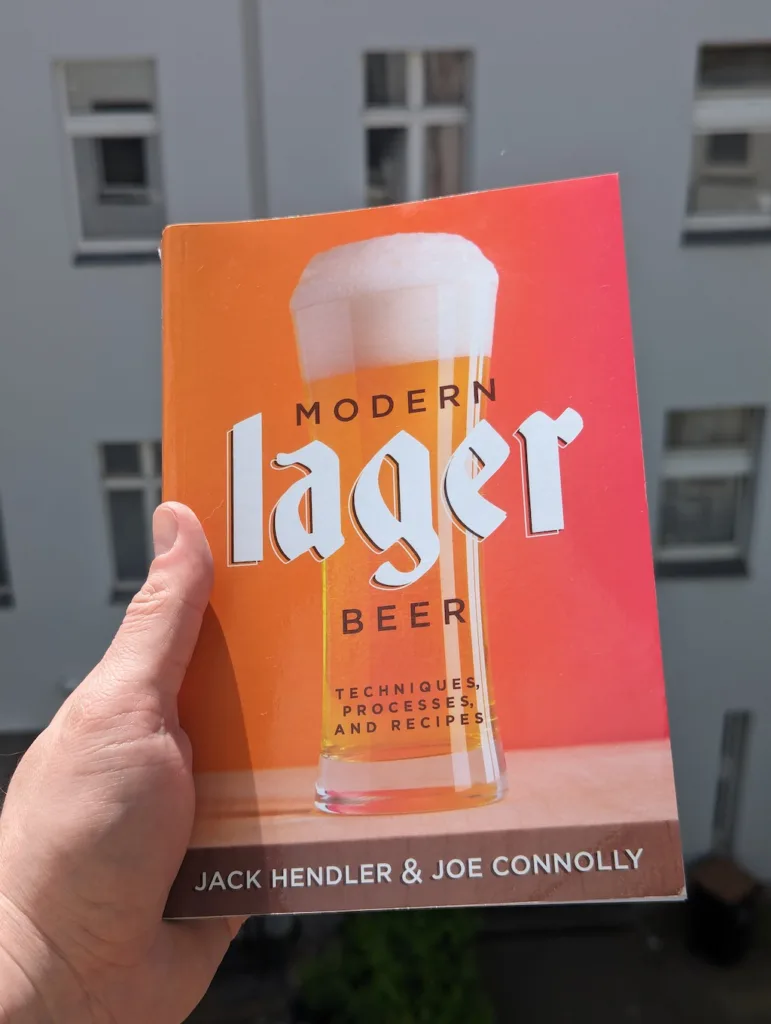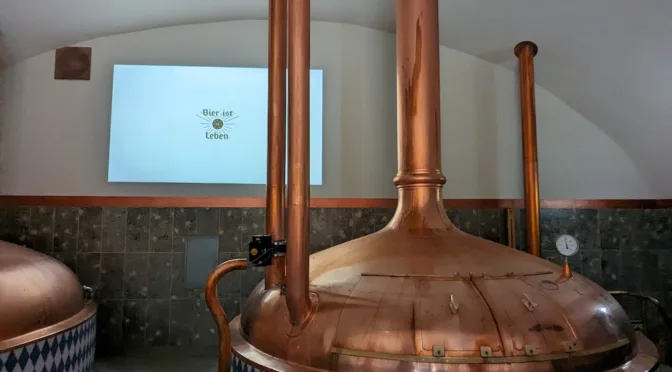Kevin Davey of Heater Allen said in a video a few months ago that there are two types of brewers: the ones that focus on a recipe and the ones that focus on the process of brewing, and that lager brewers are in the process brewer camp.
When I read the new book Modern Lager Beer by Jack Hendler and Joe Connolly, I was instantly reminded of this. Normally, home-brewing books focus on styles and on recipes. Of course, processes will also be discussed, but the focus usually lies on the former. The structure in Modern Lager Beer is very different, though: after a brief discussion of the major contemporary lager brewing traditions, the process-drivenness (is that even of a word?) of lager brewing is being acknowledged, and everything after that is being discussed is from a process perspective, not necessarily just the authors’ opinions, but also often from the view of other experienced brewers. Sometimes, these may not always match up, or even contradict each other. As such, I never felt that the book told me what is exactly right or wrong, but rather gave me insight into the possibilities and different viewpoints to achieve different goals in a beer.
Ingredients? Yeast is being discussed and compared in all its expressive parameters, including a quick guide how to choose the right strain for you, without ever getting prescriptive. The insight on malt is how much of its parameters are driven by the malting process itself, and how much of a beer (including aspects of the necessary production process) are predetermined in the malt house, including what’s relevant when working with adjuncts such as corn (maize) and rice. For water, the topics of hardness and alkalinity and their overall impact on the process and the beer are described, while hops are more discussed from the standpoint of how they can be utilized in the brewhouse, and what specific properties of hop varieties (e.g. farnesene content) can have which impact on the beer.
The emphasis on process is even more noticeable in three chapters that make up a large chunk of the whole book: fermentation, decoction mashing, and carbonation, all absolutely essential steps in brewing a great lager beer.
I think this is what sets this book really apart: fermentation is barely ever discussed to such a great detail unless you dig through the standard works like Kunze or Narziss. Whether it’s aeration, free amino nitrogen, pitching rates, top pressure or temperature, the impact on each of these is described and discussed, filled with the opinions and views of a multitude of respected brewers from both the US and Europe. Lagering is discussed in similar detail, including the question of how much of it is necessary, how progress can be monitored, what some of the risks might be under certain circumstances (such as yeast autolysis), and how they can be detected and mitigated.
The same goes for decoction mashing: only rarely discussed in detail otherwise, Modern Lager Beer really gets into all the details of single, double and triple decoction and how to decoct even on very simple brew kits that weren’t explicitly designed for decoction mashing. The authors even bring in the views of breweries that do not employ decoction mashing whatsoever, and their rationale of what they try to achieve in a beer and why decoction mashing would not be helpful in these instances.
The third otherwise rarely discussed topic is carbonation. The authors list the different options to do that, and what advantages and risks they all bring to the table, whether it’s force carbonation, spunding or kräusening. At the same time, they emphasise the importance of carbon dioxide in beer, and even call it “the fifth ingredient”.
The last third of the book is concluded with an overview over various traditional techniques and aspects, whether it’s Kellerbier, open fermentation, coolships, beer served from wooden casks, and even biological acidification (Sauergut) for pH control, an outlook on the possible future of lager beer, and finally, a collection of lager beer recipes of various styles which, matching the overall tone of the book, are still presented in a more process-oriented fashion than usual.
All in all, the book is a very dense (but not condensed) overview over all the more advanced aspects of brewing lager beer primarily in a commercial-industrial setting, but explained in such a way that home-brewers have ample starting points to get inspiration to improve their own brewing process. With plenty of sources and references, Modern Lager Beer is merely a starting point into what can become going down a rabbit hole full of rabbit holes. There’s a lot of information packed into just 300 pages, with the breadth and a level of detail that comes close to the likes of Kunze and Narziss, while remaining approachable.
As for me, I have yet to reflect on the book and what I can incorporate into my standard processes for lager brewing which have worked very well for me in the past. I’m sure there are still details that I can deal with better, but I think that requires a second and third reading of some of the chapters or sections of Modern Lager Beer.
And finally, I think it’s also worth pointing out what the book is not trying to be: it’s most certainly not a guide on individual beer styles (in fact, beer styles are rarely brought up, and my area of expertise, Vienna Lager, is only mentioned in passing as an early stage of the evolution of pale lager beers, on page 14). It is not a collection of recipe (though it does contain 30 recipes in total), nor does it contain a comprehensive history of bottom-fermented beers. And that’s fine, because in its focus on the brewing process in its many details is what makes the book really stand out for me.
If you’re a home-brewer, whether you’re just starting out with brewing lager beers, or whether you’ve gained a lot of experience already and are generally happy with what you’re brewing, do get this book and read it. It will open up your mind to all the complexities of lager brewing that most home-brewers can safely ignore, but which may still point you to some adjustments that may improve your beer even further.



Thank you very much for the review, I am still anxiously waiting for my copy to arrive.
Mine was on backorder between July and October, so I ordered it on amazon.de but with Amazon US as seller. It was two euros more expensive, but arrived 10 days after. I of course cancelled my first order.